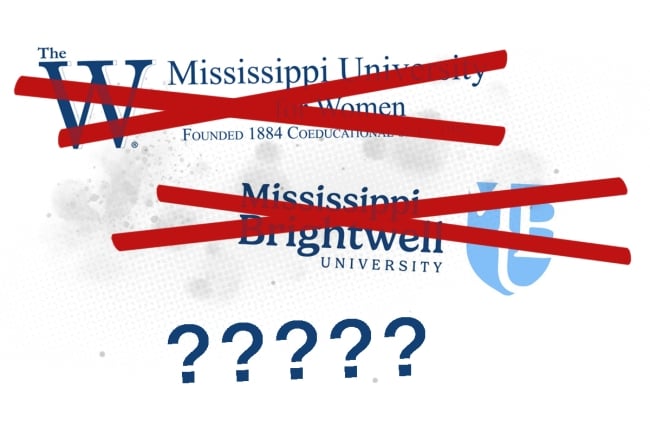You have /5 articles left.
Sign up for a free account or log in.

Photo illustration by Justin Morrison/Inside Higher Ed | Mississippi University for Women
Mississippi University for Women, which has been coeducational since 1982, has long been considering a name change. After 15 months of surveys, focus groups and meetings of a task force created to build consensus across the small public institution, university officials believed they had come up with the perfect name: Mississippi Brightwell University.
The new name reflected the university’s motto, “we study for light to bless with light.”
The response was less than enthusiastic. Countless alumni and community members were none too pleased and took to social media to voice their indignation after the university announced the new name on its Facebook page.
“What a slap in the face. Mississippi University for Women was the First [sic] public university for women. I am so upset that the mission of this institution is being erased,” Candice Lindsay, a self-described descendant of alumnae, said in a Facebook comment.
“Do better. Pay homage to the roots and history. Listen to your alumni,” commented alumna Tori Bruno Harris.
The university’s announcement has received more than 1,800 comments and nearly 800 reshares to date. The majority of the comments are negative and come from alumni and community members, not students or staff.
The complaints were persuasive. Nora Miller, the university’s president and a member of the Class of 1983, released a statement on Jan. 10 announcing that the naming task force would reconvene and make a second attempt at the rebranding. The task force will meet today to consider three newly proposed names that were sent to students, staff and alumni in an online survey last week, according to a local news report.
The proposed names will all incorporate some version of “Mississippi” and “University,” along with either Wynbridge, Welbright or Wynbright, WLBT.com, the website of the local television station, reported.
Although faculty members originally called for a name change that reflected more gender-inclusive branding, the controversy that ensued reflects broader challenges in an increasingly competitive higher ed market. Colleges, particularly small liberal arts institutions, are having to work harder to recruit and keep students and to stand out at a time when the traditional college-age population is shrinking.
Some colleges are rebranding and trying to be more inclusive as a result, promoting themselves as welcoming to first-generation or rural students, for instance. Others are focusing on older students, young working adults, people who attended college but left without earning degrees or older workers needing new skills to stay viable in an increasingly skills-based job market.
Any of these approaches can be a tricky balancing act and, as is the case with Mississippi University for Women, can result in unexpected outcomes.
A Mea Culpa and An Explanation
Miller said the effort was hurt by the task force’s decision to test branding concepts and naming themes but not publicly float the name “Mississippi Brightwell University” as an option. The new name was not revealed until the rebranding was announced at a spring convocation ceremony on Jan. 9.
“The misstep we took was in treating this like expectant parents who are advised not to reveal the names until the baby’s here,” Miller said. “The name ‘Brightwell’ was such a surprise to people that I don’t think they paid attention to the reasoning.”
Grant De Roo, founder of ADV Market Research & Consulting, a higher education brand strategy organization, believes there is a flaw in Miller’s analogy.
“Grandparents, friends, etc., don’t have a stake in the baby’s name,” he said. “That’s not the case here. Alumni, students, community employers even, they have a stake.”
Miller said it was also a mistake not to incorporate “The W,” the university’s affectionate, decades-old nickname, in the new moniker. Although some discussion about the value of “The W” came up in focus groups, the task force consciously decided to avoid diminishing the institution’s roots as a women’s college.
But that’s not how alumni saw things. The student body is still majority female—78 percent—and one of the most common complaints on social media about the proposed name was loss of “The W.”
Driving Forces Behind the Name Change
Public statements by the task force and administrators, before and after the Jan. 9 announcement, made clear that removing “any barriers to expanding enrollment” was the driving force for the name change.
The university has seen a dip in overall enrollment over the last five years. According to the National Center for Education Statistics, the institution’s head count dropped from 2,789 students in 2017 to 2,339 in 2022. Although the proportion of male students has risen six percentage points over the last 40 years, Miller believes an untapped population of male students could help increase enrollment numbers.
“Even though we’ve been coed for 41 years, a lot of men don’t realize that,” Miller said. “A name change will open us up to so many more students.”
Pat McGuire, president of Trinity Washington University, a women’s college in D.C., said other colleges are grappling with the same economic and demographic forces.
“Every institution today—whether it’s Wellesley, which is very strong, or Trinity, which has our struggles, or Mississippi University for Women—everybody is looking at the enrollment cliff and saying, ‘How are we going to rebrand and reposition ourselves in the marketplace?’” McGuire said. “This is not a discussion just about women’s colleges, or the use of the word ‘woman’ in the title. This is a significant national discussion.”
McGuire noted that Mississippi’s task was made more difficult because “women” is part of its name.
Texas Woman’s University, a public institution north of Dallas that has been coed since 1972, is the only other remaining women’s institution with “woman” in its name. Unlike Mississippi, it is still a member of the Women’s College Coalition and has a male student population of just 11 percent. Its enrollment grew from 15,473 in 2017 to 15,958 in 2022.
Matthew Flores, a spokesperson for Texas Woman’s, said there have not been any proposals to change the institution’s name since it got its current name in 1957.
“Cultivating women leaders has long been a hallmark of Texas Woman’s University, which has built a strong reputation of offering a quality, woman-focused education,” he said. “And that appeals to many individuals regardless of their gender.”
Of the few colleges that did drop “women” or “woman” from their names, such as the former Randolph-Macon Woman’s College, which became Randolph College when it went coed in 2007, most were able to maintain a core element of their names.
Many of the more than 100 historically women’s institutions that are now coeducational went from being colleges to universities. Converse College in South Carolina, renamed Converse University in fall 2021, is one of the most recent examples.
Other institutions simply changed their look. Rosemont College in Pennsylvania, for example, which had formerly branded itself with stereotypically feminine symbols—its logo was pink and laden with roses—switched to red and introduced a new mascot, a raven.
“They’re really trying to appeal to men but not lose their heritage,” McGuire said. “These women’s colleges who go coed really tried to straddle that difference.”
De Roo, from ADV Consulting, said there may be more effective and less risky ways for women’s colleges to “gain traction in the market” than changing their names. For instance, they introduce new academic programs or majors, such as engineering, that are likely to attract more men.
“It behooves an institution in today’s environment to try to make itself as appealing to as many people who are willing to consider it,” he said. “The challenge, I would say, is does this have any negative repercussion going the other way?”
A Different Perspective
Samuel Gerrie, president of the Student Government Association at Mississippi University for Women, said most of the opposition to the name change came from alumni, while current students largely agreed on the need for the college to have a new image as forward-thinking and inclusive.
“There were some who wanted to keep ‘The W,’” he said. “But I would say the majority understood what the goal of the name change was.”
Gerrie said that when he attended a college fair in northern Alabama as a high school student, he wouldn’t have stopped at Mississippi University for Women’s booth if a dedicated admissions representative had not sold him on the college.
“At first sight I walked right by the table and didn’t think anything about it because of the name,” he said. But after a spiel about a major he was interested in and a campus tour, “I pretty much fell in love with the atmosphere and the class ratio sizes.”
If an ongoing poll conducted by the Clarion-Ledger, a local newspaper, is any indication, the divide between name-change opponents and supporters may not be bridged anytime soon. Nearly 82 percent of over 11,000 respondents said they opposed the new name.
That’s not surprising for a university that has experienced a long and contentious history of renamings. It was founded in 1884 as the Industrial Institute and College for the Education of White Girls. It became the Mississippi State College for Women in 1920 but remained racially segregated until 1966, when six Black women were admitted. The name was changed again in 1974, to Mississippi University for Women.
University leaders have been considering rebranding since the U.S. Supreme Court ruled in 1982 that the institution's nursing program had to admit men. State officials later decided to make all the programs co-educational. (This paragraph was corrected to clarify that the court ruling was made by the U.S. Supreme Court, not the Supreme Court of Mississippi, and that state officials later made all the university's programs co-ed.)
The closest the institution came to a name reflective of its coed status was in 2009, when university leaders attempted to change the name to Welty University in honor of Pulitzer Prize–winning author and alumna Eudora Welty. The late author’s family did not approve.
Heather Fasciocco Stone, president of the Alumni Association, told SuperTalk Mississippi, a local radio network, that the association supports the efforts to “expand the university’s legacy.”
“Our alums love this university, its rich history and traditions,” she said. “Change is always hard, and there will be some grieving, but we’ve navigated this type of change before.”








.jpg?itok=L3VLoWsE)